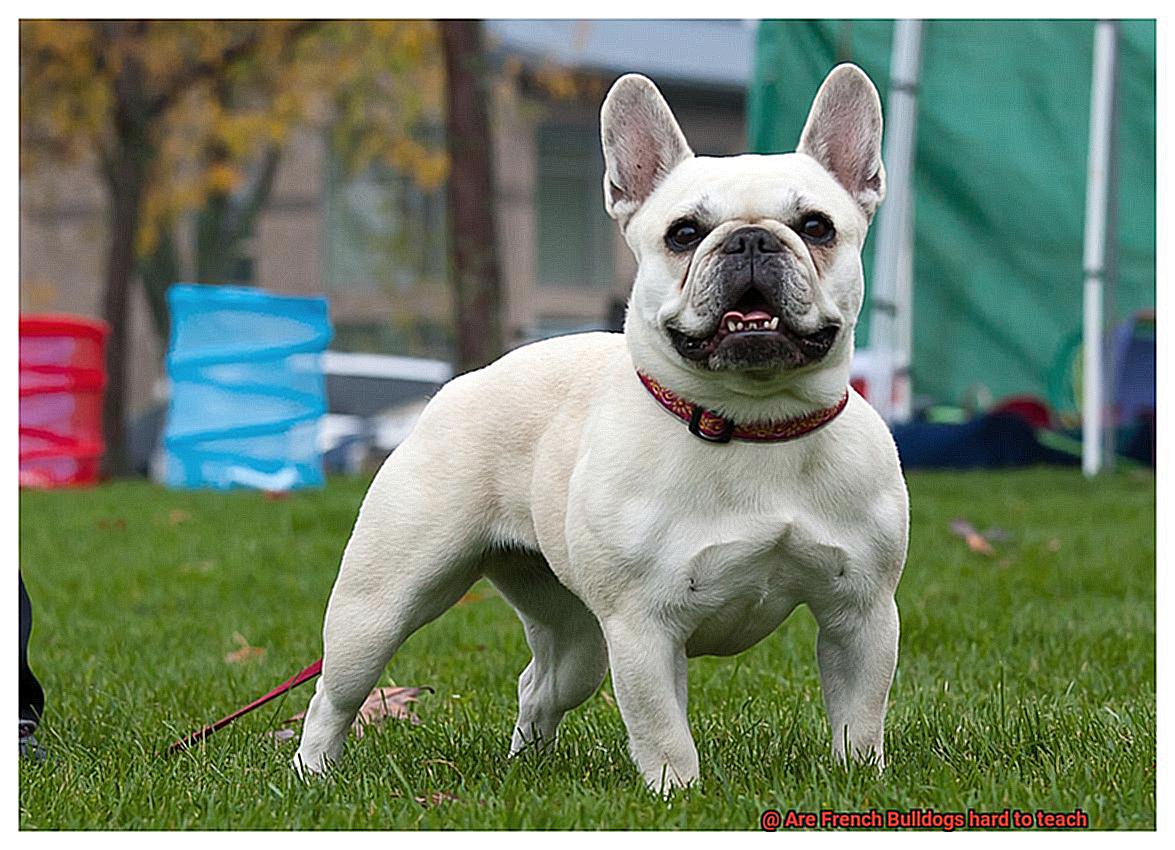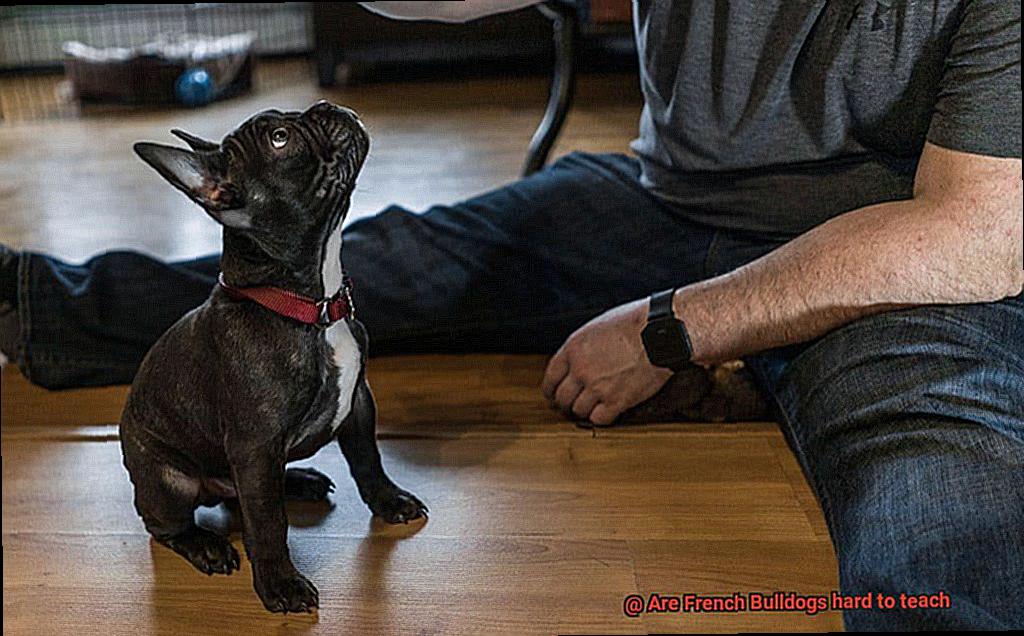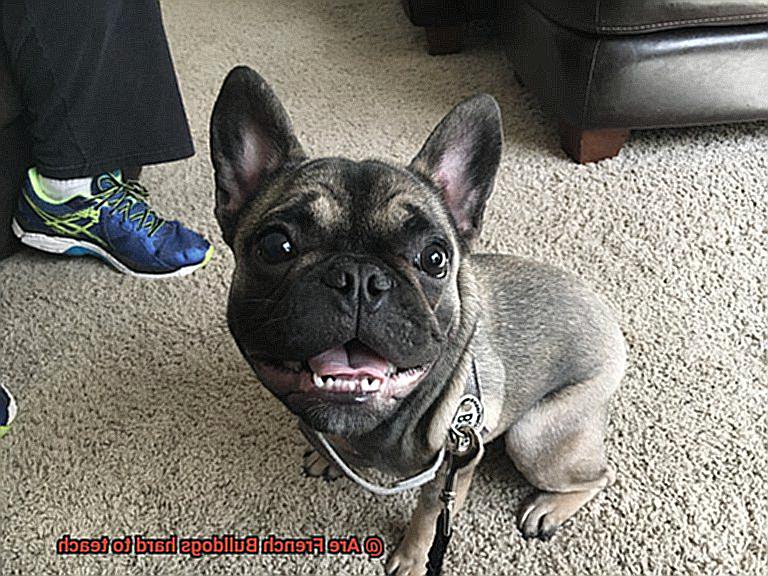Are French Bulldogs hard to teach?
French Bulldogs, with their adorable wrinkled faces, bat-like ears, and mischievous personalities, have stolen the hearts of dog lovers worldwide. But let’s address the big question – are French Bulldogs hard to teach? This has left many pet enthusiasts scratching their heads and wondering if these charming canines are a challenge when it comes to training.
In this captivating blog post, we dive into the intriguing world of French Bulldogs to uncover the truth behind their teachability. From unraveling their unique behavior quirks to evaluating their intelligence and trainability, we’ll provide you with an in-depth analysis that will shed light on these delightful yet sometimes puzzling creatures.
Whether you’re already smitten with a Frenchie or simply considering adding one to your furry family, this guide will equip you with the knowledge and insights needed to navigate the training process with ease.
So, grab your favorite brew and join us on this exciting journey into the realm of French Bulldogs, where curiosity meets education in pursuit of canine harmony.

Understanding the Stubborn Nature of French Bulldogs
Contents
- 1 Understanding the Stubborn Nature of French Bulldogs
- 2 Establishing Yourself as the Leader in Training
- 3 Positive Reinforcement Techniques for French Bulldogs
- 4 The Benefits of Consistency When Training French Bulldogs
- 5 Short and Intensive Training Sessions for French Bulldogs
- 6 Gentle Corrections and Positive Reinforcement for French Bulldogs
- 7 Socialization is Crucial for French Bulldogs
- 8 Obedience Training is Essential for French Bulldogs
- 9 Conclusion
French Bulldogs are also known for their stubborn streak, which can make training them a bit challenging. In this blog post, we will explore why patience, consistency, and positive reinforcement are essential when training these determined little dogs.
Understanding the Stubborn Nature:
French Bulldogs possess a strong-willed and independent personality that sets them apart from other breeds. They have a mind of their own and may not always be motivated by traditional training methods. Instead of blindly following commands, they prefer to do things their own way, which can sometimes frustrate their owners.

The Importance of Patience and Consistency:
When it comes to training French Bulldogs, patience is key. They may take longer to learn certain commands or behaviors compared to other breeds. But don’t worry. With persistence and a calm approach, you can make progress. Consistency is equally crucial – setting clear boundaries and expectations from the start will help establish your role as the leader in their eyes.
Positive Reinforcement Works Wonders:

French Bulldogs respond well to positive reinforcement techniques. Rather than punishing them for undesired behavior, focus on rewarding good behavior with treats, praise, and affection. This approach encourages them to repeat the desired actions and creates a positive association with training sessions. Remember, a gentle touch goes a long way with these sensitive souls.
Keeping Training Sessions Engaging:
French Bulldogs have short attention spans and can easily become bored or distracted during training sessions. To combat this, keep sessions short and engaging. Incorporate fun activities or toys into the training to hold their interest and maintain motivation. By making training enjoyable for them, you’ll see better results.
Socialization: The Key to Harmonious Behavior:
Due to their independent nature, French Bulldogs may be prone to aggression or territorial behavior if not properly socialized. Introduce them to different environments, people, and other dogs from an early age to help them become well-rounded and friendly companions. Socialization is an integral part of training and ensures a happy, well-adjusted French Bulldog.
Establishing Yourself as the Leader in Training
French Bulldogs are known for their adorable appearance, playful demeanor, and unique personalities. However, training these spirited little dogs can sometimes be a challenge. To effectively train your French Bulldog, it is crucial to establish yourself as the leader in their eyes.
In this blog post, we will explore the importance of leadership in training and provide expert tips and techniques to help you establish yourself as the pack leader.
Understanding the Pack Mentality
French Bulldogs, like their ancestors, are pack animals at heart. They instinctively seek out a hierarchical structure within their social group. As their owner and trainer, it is your responsibility to assume the role of the pack leader. By doing so, you gain their respect and trust, making the training process much smoother.
Consistency is Key
Consistency is crucial when establishing yourself as the leader in training. Set clear boundaries and expectations from the beginning and consistently enforce them. For example, if you don’t want your French Bulldog to jump on furniture, be firm and consistent in not allowing it. When they understand that you consistently reinforce these rules, they will learn to respect your authority.
Positive Reinforcement Training
Positive reinforcement training is an effective method for training French Bulldogs. Instead of focusing on punishment for undesirable behavior, focus on rewarding good behavior. Use treats, praise, and affection as rewards when your French Bulldog follows commands or behaves appropriately. This positive reinforcement motivates them to continue behaving well and strengthens the bond between you.
Confidence and Assertiveness
French Bulldogs are highly sensitive to their owner’s energy and body language. To establish yourself as the leader, it is essential to be confident and assertive during training sessions. If you appear unsure or hesitant, they may not take you seriously as their leader. Projecting confidence and assertiveness will command their respect and make training more effective.
Avoid Harsh Methods
Leadership in training does not mean being harsh or overly dominant. Using force or punishment-based methods can lead to fear or aggression in your French Bulldog, which hinders the training process and damages the bond between you. Instead, focus on positive reinforcement and consistent boundaries to establish yourself as a leader they can trust and respect.
By following these expert tips and techniques, you can establish yourself as the leader in training and unlock the full potential of your French Bulldog. Remember that training is not just about teaching commands; it is about building a bond based on trust and mutual understanding. With patience, consistency, and positive reinforcement, you can create a harmonious relationship with your furry companion that will last a lifetime.
Positive Reinforcement Techniques for French Bulldogs
French Bulldogs are known for their charming and lovable personalities. They are intelligent, eager to please, and make wonderful companions. When it comes to training your French Bulldog, positive reinforcement techniques are not only effective but also essential in building a strong bond with your furry friend.
In this blog post, we will explore the importance of positive reinforcement and provide you with some expert tips to make the training process fun and rewarding for both you and your French Bulldog.
Rewards that Make Their Tail Wag
The key to successful positive reinforcement training is finding the right rewards that motivate your French Bulldog. While treats are a popular choice, it’s important to discover what really gets their tail wagging. Experiment with different types of treats, such as small pieces of cooked chicken or cheese, and observe which ones your dog responds to best. Remember, the more enticing the reward, the more motivated they will be to repeat the desired behavior.
Praise and Affection – Their Love Language
French Bulldogs thrive on human attention and love to be praised. Verbal praise and physical affection can be powerful rewards in training. A simple “good boy/girl” or a pat on the head can go a long way in reinforcing positive behaviors. It’s important to be consistent in your praise and use a happy tone of voice to show your excitement and approval. Shower them with love, and watch how their eagerness to please grows.
Timing is Everything
Timing plays a crucial role in positive reinforcement training. The reward should be given immediately after the desired behavior occurs so that your French Bulldog can associate the action with the reward. This helps them understand what they did right and encourages them to repeat the behavior in the future. Be quick with your rewards, and watch as your furry friend quickly learns what behaviors lead to delicious treats or praise.
Break it Down, Step by Step
Breaking down the desired behavior into small steps or commands can make training much easier for your French Bulldog. For example, if you want your dog to learn how to sit, you can start by rewarding them for simply bending their knees or lowering their hindquarters.
Gradually increase your criteria until they are fully sitting on command. By taking small steps and building upon them, you set your French Bulldog up for success and make the training process less overwhelming.
Consistency is Key
Consistency is the secret ingredient to successful positive reinforcement training. Make sure everyone in your household is aware of the training techniques being used and follows them consistently. This helps avoid confusion for your French Bulldog and ensures they receive clear signals about what is expected of them.
Consistency creates a structured environment that allows your furry friend to thrive and excel in their training.
The Benefits of Consistency When Training French Bulldogs
If you’re looking to train your Frenchie like a pro, then consistency is the secret ingredient you can’t afford to overlook. As an expert in the field and a proud owner of French Bulldogs, I can testify to the countless benefits that come with consistent training. In this blog post, we’ll explore why consistency is crucial for French Bulldog training and how it can help you establish a well-behaved and obedient companion.
Reinforcing Desired Behaviors:
Consistency in training allows you to reinforce desired behaviors effectively. By consistently rewarding good behavior and redirecting or ignoring bad behavior, you send clear messages to your Frenchie about what is acceptable and what is not. This helps them understand their boundaries and encourages positive habits.
Building a Strong Bond:
When your French Bulldog knows what to expect from you and understands the rules of the household, they feel more secure and confident in their interactions with you. Consistency helps to establish a strong bond between you and your Frenchie, enhancing trust and communication.
Preventing Behavioral Issues:
Consistent training plays a pivotal role in preventing behavioral issues in French Bulldogs. By consistently reinforcing positive behaviors such as sitting or staying, you set your Frenchie up for success and reduce the likelihood of problem behaviors like jumping or excessive barking.
Generalization of Learning:

Consistency in training allows your French Bulldog to generalize their learning. When cues, commands, and expectations remain consistent, your Frenchie learns to associate them with specific actions, regardless of the environment or situation. This ensures that their training carries over seamlessly into different contexts.
Clear Communication:
Consistency fosters clear communication between you and your French Bulldog. By being consistent in your commands, body language, and expectations, your Frenchie can understand what you want from them more easily. This leads to quicker and more effective training sessions, as they can grasp your intentions readily.

Stability and Structure:
Consistency should extend beyond training sessions and encompass all aspects of your French Bulldog’s life. By maintaining consistent feeding schedules, exercise routines, and socialization experiences, you provide stability and structure for your Frenchie. This contributes to their overall well-being and helps them thrive.
Short and Intensive Training Sessions for French Bulldogs
Short and Intensive Training Sessions for French Bulldogs: Mastering the Basics in No Time.
Does your French Bulldog have a mind of its own when it comes to training? Don’t worry, you’re not alone. French Bulldogs are known for their stubbornness and independent nature, making training a challenge for many owners. But fear not, with the right approach and techniques, you can turn your Frenchie into a well-behaved and obedient companion.
One effective strategy for training French Bulldogs is to keep the sessions short and intensive. These little furballs have short attention spans and can easily get bored, so long training sessions are unlikely to yield optimal results. Instead, opt for 10-15 minute sessions that focus on one command or behavior at a time.
To make the most of these short training sessions, try incorporating the following tips:
- Positive Reinforcement: French Bulldogs respond well to positive reinforcement techniques. Use treats, praise, and rewards to motivate and encourage your Frenchie during training. This will make the experience more enjoyable for them and increase their willingness to learn.
- Break it Down: Break down complex commands or behaviors into small steps. Start with simple tasks and gradually increase the difficulty level as your dog progresses. This approach ensures that your Frenchie doesn’t get overwhelmed and can fully grasp each step before moving on.
- Keep it Engaging: Make training sessions interactive and engaging by incorporating toys, games, and playtime as rewards. This not only adds an element of fun but also keeps your Frenchie’s interest levels high throughout the session.
- Consistency is Key: Establish a routine and stick to it. Consistency is crucial when training French Bulldogs. Make sure everyone in the household follows the same rules and commands to avoid confusing your furry friend.
- Patience is a Virtue: French Bulldogs might take a little longer to grasp certain commands due to their stubborn nature. Be patient and understanding during the training process. Avoid getting frustrated and remain calm, as your Frenchie will pick up on your energy.
- Seek Professional Help if Needed: If you find it challenging to train your French Bulldog or encounter specific behavioral issues, don’t hesitate to seek professional help. Consulting a professional dog trainer who specializes in working with this breed can provide valuable guidance and support.

Gentle Corrections and Positive Reinforcement for French Bulldogs

French Bulldogs, with their adorable faces and delightful personalities, are a joy to have as companions. However, like any other breed, they require proper training to ensure they become well-behaved members of your family. In this blog post, we will delve into the importance of using gentle corrections and positive reinforcement when training your French Bulldog.
The Power of Positive Reinforcement:
Positive reinforcement is a key component in training French Bulldogs. By rewarding desired behaviors with treats, praise, or playtime, you can encourage your furry friend to repeat those behaviors. This method works wonders because French Bulldogs, being sensitive dogs, respond best to positive training techniques.
Gentle Corrections: Handle with Care:
While positive reinforcement is essential, there may be instances where gentle corrections are necessary. However, it’s important to use them sparingly and with utmost care. Remember, French Bulldogs thrive on positivity and respond poorly to harsh or aggressive methods. A firm but gentle correction should redirect their attention to an appropriate behavior, followed by a reward for performing it correctly.
Consistency is Key:
Consistency is paramount when training your French Bulldog. They need to understand that certain behaviors will always result in rewards while others won’t. By being consistent in your approach, you’ll help them grasp the desired commands and behaviors more effectively.
Patience and Understanding:

Training a French Bulldog requires patience and understanding. Every dog is unique, and some may take longer to learn certain commands or behaviors. Embrace their individuality and provide consistent positive reinforcement to help them excel in their training journey.
Short and Fun Sessions:
French Bulldogs have shorter attention spans compared to some other breeds. To keep them engaged during training sessions, break them down into short and fun activities throughout the day. This approach will ensure they remain motivated and eager to learn.
Variety is the Spice of Training:
To keep your French Bulldog stimulated, incorporate a variety of positive reinforcement techniques into their training. Mix it up with treats, toys, and plenty of praise to maintain their enthusiasm and focus.
Avoid Punishment-Based Training:

Punishment-based training methods have no place in training French Bulldogs. Such techniques can lead to fear, anxiety, and resistance towards training. It’s essential to create a safe and positive environment that fosters learning and growth.

Socialization is Crucial for French Bulldogs
French Bulldogs are known for their friendly and affectionate nature, but they can also be stubborn and independent at times. This can make them somewhat challenging to train if not properly socialized from a young age.
So, why is socialization so important for this breed? Let’s dive in and explore the benefits of socialization for French Bulldogs.
Why Socialization Matters
Socialization refers to the process of exposing a dog to different people, animals, environments, and situations in order to help them become well-rounded and adaptable. It is crucial for French Bulldogs because it helps them develop positive behaviors and prevents behavioral issues such as aggression, fearfulness, and anxiety. Here’s why socialization matters:
- Builds Positive Behaviors: By exposing your French Bulldog to various experiences and stimuli, you are helping them learn how to behave appropriately in different situations. This includes interacting politely with people of all ages and other dogs. Socialization teaches them valuable skills such as greeting others calmly, playing nicely, and being comfortable in various environments.
- Prevents Behavioral Issues: Proper socialization can prevent common behavioral issues in French Bulldogs, such as aggression, fearfulness, and anxiety. By exposing them to different people and situations early on, you are helping them form positive associations with new experiences. This reduces the likelihood of them developing fear or aggression towards unfamiliar people or environments.
- Boosts Confidence: Introducing your French Bulldog to different sounds, sights, and smells helps build their confidence and adaptability. Taking them on walks in different environments, such as busy streets or parks, gradually increases their exposure level. This helps them become more comfortable in new situations, making them better equipped to handle new experiences throughout their lives.
Tips for Socializing Your French Bulldog
Now that we understand the importance of socialization for French Bulldogs, let’s explore some tips for successful socialization:
- Start Early: The critical socialization period for puppies is between 3 weeks and 14 weeks of age. During this time, they are more receptive to learning and forming positive associations with new things. Start exposing your French Bulldog puppy to various experiences and stimuli as early as possible.
- Positive Reinforcement Training: French Bulldogs respond well to positive reinforcement training methods. Use treats, praise, and rewards when they exhibit desired behaviors. Consistency and patience are key when teaching them commands and tricks.
- Controlled Exposures: Introduce your French Bulldog puppy to different people, dogs, environments, and situations in a controlled manner. Puppy socialization classes or dog parks can provide opportunities for them to learn appropriate play behavior and interact with other dogs under supervision.

Obedience Training is Essential for French Bulldogs

French Bulldogs can also be a bit stubborn and independent, which makes obedience training crucial for their well-being and the happiness of their owners. In this blog post, we will explore the reasons why obedience training is essential for French Bulldogs, how it benefits both the dog and the owner, and offer practical tips for successful training.
Safety First:
Obedience training teaches them important commands like “sit,” “stay,” and “come,” which can prevent accidents and keep them out of harm’s way. By establishing control in various situations, owners can confidently take their French Bulldogs out in public, knowing they will respond to commands promptly.
Strengthening the Bond:
Training sessions provide an excellent opportunity for owners to bond with their French Bulldogs. These dogs thrive on attention and praise, making positive reinforcement techniques highly effective.
By rewarding good behavior with treats, verbal praise, or playtime, owners can motivate their French Bulldogs to learn and obey commands willingly. This not only strengthens the bond between the dog and owner but also fosters a sense of trust and mutual respect.
Start Early:

Early socialization and training are crucial for French Bulldogs. Puppies have a higher capacity for learning and are more receptive to training compared to adult dogs. Starting obedience training at a young age will help establish good habits, prevent the development of bad behaviors, and ensure a well-behaved dog in the long run.
Short and Engaging Sessions:
French Bulldogs have a shorter attention span compared to some other breeds. To keep them focused during training sessions, it is important to make them short, fun, and engaging. Breaking down tasks into smaller steps and rewarding small achievements will help maintain their interest and motivation.
Seek Professional Help:
Consider enrolling your French Bulldog in professional obedience training classes or working with a dog trainer who specializes in this breed. These experts have the knowledge and experience to tailor training techniques to meet the specific needs of French Bulldogs. They can provide guidance, support, and extra motivation for both the dog and the owner.
tH991oUcmis” >
Conclusion
French Bulldogs can be a bit challenging to train, but with the right approach and patience, they can be taught effectively.
While they may not be as eager to please as some other breeds, their intelligence and loyalty make them capable learners. It’s important to remember that each dog is unique and will have their own learning style and pace.
Consistency is key when teaching French Bulldogs, as they respond best to routines and clear expectations. Positive reinforcement techniques such as treats, praise, and rewards work wonders in motivating them.
Short training sessions are recommended as these dogs have shorter attention spans. By breaking down commands into small steps and using repetition, French Bulldogs can gradually grasp new skills.
It’s also helpful to focus on their individual strengths and interests during training, making it more engaging for them.




